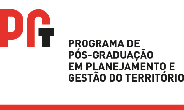Banca de DEFESA: LAISA ELEONORA MAROSTICA STROHER
Uma banca de DEFESA de DOUTORADO foi cadastrada pelo programa.DISCENTE : LAISA ELEONORA MAROSTICA STROHER
DATA : 30/08/2019
HORA: 14:00
LOCAL: Auditório 801-A, 8º andar, Bloco B, Campus SA da Fundação Universidade Federal do ABC, localizado na Avenida dos Estados, 5001, Santa Terezinha, Santo André, SP
TÍTULO:
THE SOCIAL CONSTITUTION OF URBAN FINANCIALIZATION IN BRAZIL: THE ROLE OF URBAN OPERATIONS WITH BUILDING CERTIFICATES
PÁGINAS: 283
GRANDE ÁREA: Ciências Sociais Aplicadas
ÁREA: Planejamento Urbano e Regional
SUBÁREA: Fundamentos do Planejamento Urbano e Regional
ESPECIALIDADE: Política Urbana
RESUMO:
The research is aimed at the elaboration of a critical investigation of the trajectory of Urban Partnership Operations (UPOs), with a focus on its financial mechanism, i.e. the additional building right certificate. The application of UPOs in São Paulo – particularly in the Água Espraiada and Faria Lima projects – represents the main object of the analysis, which nevertheless includes considerations on the experience in Rio de Janeiro and on the attempts to disseminate the instrument in other municipalities. We seek to contribute to the understanding of the challenges of financialization and neoliberalization for urban governance. More specifically, the investigation is aimed at providing new insights to comprehend the process through which financial logics, metrics and agents penetrate into the built environment, thereby triggering structural transformations in the provision of infrastructure, urban planning and patterns of financing urban development. For this purpose, the thesis is structured in three parts. The first is dedicated to the debate on the capitalist mode of regulation in the post-1970 setting of industrialized countries, with the increasing dominance of finance capital, and how these processes generate new state spatial regimes. In the second part, these themes are contextualized for the Brazil scenario, observing how they articulate to the historical aspects of urbanization, and the restructuring of national-developmentalism. In the last chapter a historical review is elaborated on the trajectory of the UPOs, based on the dialectical interaction between the “Idealized UPO” and “The really existing UPO”. We argue that the difficulties of the UPOs to live up to the expectations is related to the intrinsic contradictions that accompany its design, such as the premise of a convergence between public and private interests; the speculative nature and uncertainties of land rent generation; the pace of its constitution, and the imbricated relations of these dimensions with the certificate’s price. It is also related to the calculative practices that underpin the pricing of CEPACs, which are aimed at the preservation of developer’s profitability and are not necessarily linked to the cost of infrastructure. The investigation of the historical evolution of the UPOs, since their origin to the new arrangements created after the experience of Porto Maravilha, indicate the progressive penetration of financial rationalities, practices and actors. The latter has triggered the treatment of the urban commons – land, infrastructure networks, public funds and taxes – as financial assets, which enabled the generation and anticipation-capitalization pf periodic cash flows. The emerging scenario is one marked by a new cycle of urban neoliberal experimentation, characterized by the diversification of instruments based on public-private partnerships and ad-hoc territorial interventions, new subnational state institutionalities that act as entrepreneurs of public goods, the securitization of an increasingly diversified number of financial flows extracted from cities, and the increasing permeability of the private sector in urban management, with a more intense participation of foreign stakeholders in the provision of infrastructure. This all points out to the growing complexity of the social conflict structured around the private appropriation of wealth generated in cities, and the increasing challenge to develop urban policies that are not encapsulated by criteria of commodification.
MEMBROS DA BANCA:
Presidente - Interno ao Programa - 1516741 - JEROEN JOHANNES KLINK
Membro Titular - Examinador(a) Interno ao Programa - 1144005 - MARCOS BARCELLOS DE SOUZA
Membro Titular - Examinador(a) Interno ao Programa - 2361011 - BEATRIZ TAMASO MIOTO
Membro Titular - Examinador(a) Externo à Instituição - PAULA FREIRE SANTORO
Membro Titular - Examinador(a) Externo à Instituição - MARIANA DE AZEVEDO BARRETTO FIX - UNICAMP
Membro Suplente - Examinador(a) Interno ao Programa - 2265555 - LUCIANA NICOLAU FERRARA
Membro Suplente - Examinador(a) Externo à Instituição - MARIA BEATRIZ CRUZ RUFINO




